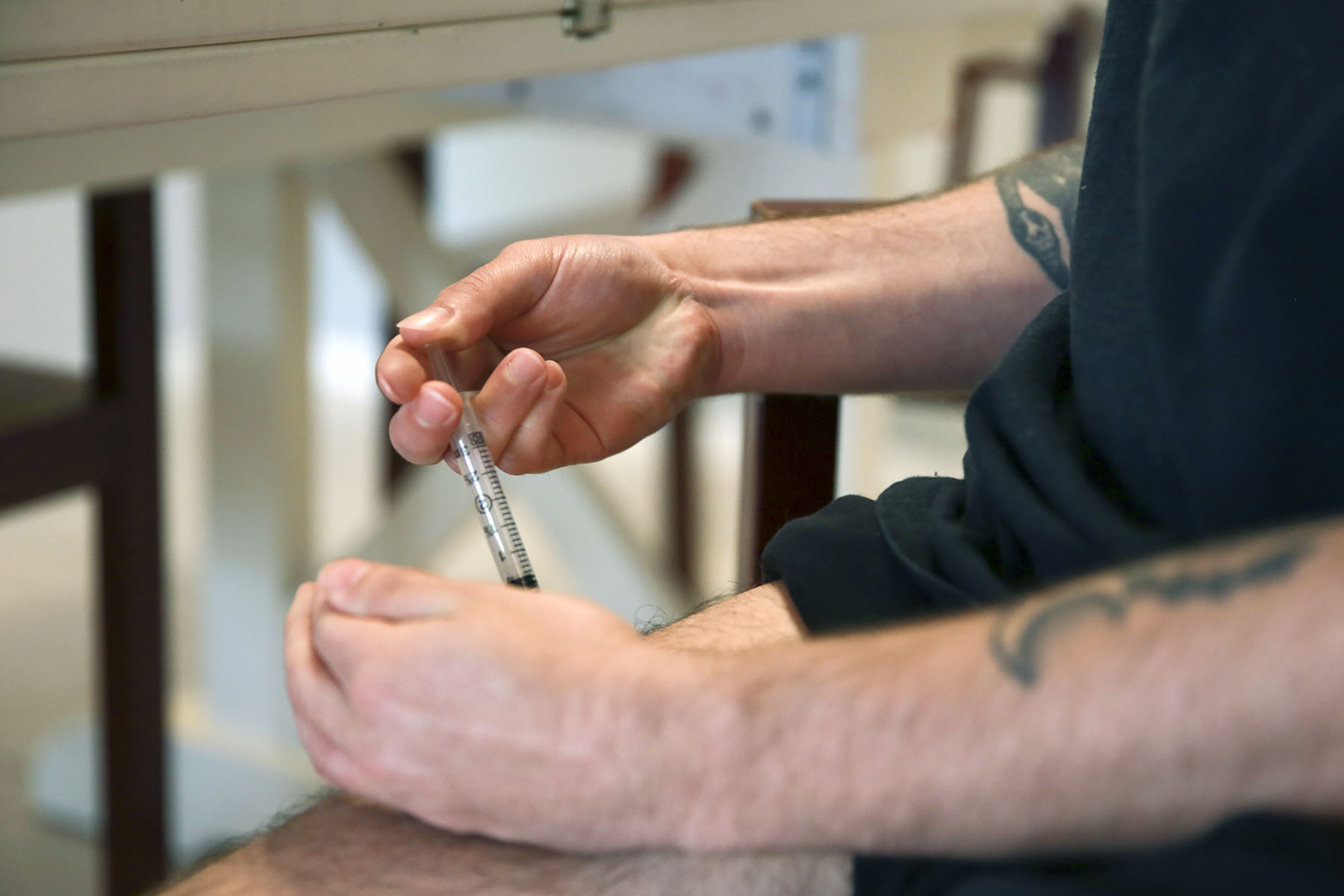Your trusted source for contextualizing LGBTQ+ and health news. Sign up for our daily newsletter.
Two Florida medical boards met Friday to finalize rules for how transgender minors and adults in the state can access gender-affirming care. Amid confusion that has prevented adults from accessing care, LGBTQ+ Floridians and their doctors asked the boards to do better to protect trans people — and to acknowledge gender-affirming care as legitimate medical care.
The boards acted in response to a law signed in May by Gov. Ron DeSantis, which restricted access to gender-affirming care for trans adults and minors. The law gave the state’s Board of Medicine — and its Board of Osteopathic Medicine — 60 days to develop rules on how minors may continue to be treated with puberty blockers and hormones and charged them with creating informed consent forms for adults.
In the aftermath of DeSantis signing the law, LGBTQ+ advocates say that some physicians simply stopped providing gender-affirming care — since they did not yet have the informed consent documents finalized on Friday.
Meanwhile, over the last month, transgender adults in Florida have been turned away at the pharmacy amid confusion about the state’s evolving policies restricting gender-affirming care.
“Almost every day we have one or two patients calling us in a panic because they’re at the pharmacy,” said Joey Knoll, an adult-gerontology primary care nurse practitioner. He is the CEO of Spektrum Health, an LGBTQ+ health care clinic based in Orlando. Even some of his cisgender patients receiving hormone therapy have been turned away in the chaos, he said.
The confusion at pharmacies stems in part from a law that DeSantis signed in May. It mandated that trans adults may receive gender-affirming care from only physicians, instead of nurse practitioners.
Nurse practitioners provide a lot of gender-affirming care in Florida, said Knoll, who served on the board for the Florida Association of Nurse Practitioners for eight years. He believes that the restrictions were meant to limit care to as many trans adults in the state as possible.
“There’s a lot of fear that’s building down here,” he said.
Spektrum Health is a nurse-led clinic — meaning there aren’t any doctors on staff. The clinic is working to onboard part-time doctors, which is a lengthy process, Knoll said. In the meantime, patients have at least six months’ worth of medication that the clinic prescribed in early May — an effort the staff made to ensure care for as many adults as possible ahead of the law being signed.
Meanwhile, patients have been caught in the middle.
Andrea Montanez is one of those patients. Her local Walgreens in Orlando denied her refill of estradiol, part of her prescribed hormone therapy, on June 6. She gets her prescription from Spektrum. Knoll had written her a six-month prescription before May 17, when the law was signed and went into effect, she said.
Since her prescription was written before the law was signed, she told the pharmacy that she should still have access to the medication. At first, they denied her refill.
“The manager told me that they read the news … the news says they cannot do it. I explain to them no, my prescription was filled before May 17, and the law says that,” she said. The Walgreens pharmacy told her that it was just following corporate policy, although it wasn’t clear to her what policy that was.
The pharmacy’s on-site manager did not respond to interview requests. A Walgreens spokesperson said that the company can’t comment on specific patient experiences but that Walgreens is following Florida law. In May, Walgreens told its pharmacists that, in Florida, they must fulfill hormone prescriptions written by nurse practitioners before May 17, in compliance with the law, the spokesperson said. However, once refills run out or the prescription expires, a new prescription from a physician is required, he said.
-
Read Next:
Montanez, a local fixture in the LGBTQ+ community, quickly rallied support after she was denied her medication at Walgreens. As her friends called and put more pressure on, she was able to persuade the pharmacy to hand over her prescription. But she’s worried about trans people who don’t have the kind of network that she has.
“I had help. Can you imagine what would happen with all these people without the support I got for myself?” Montanez said. Other trans people may not know that they can fight to get their prescriptions — especially in the current culture of fear — and may turn to unsafe black market hormones, she said.
She picked up her prescription June 9, only a few days after it was first denied to her. Democrat Anna Eskamani, a member of the Florida House of Representatives, personally got involved to get Montanez her prescription back.
Eskamani had back-forth-calls with Walgreens’ corporate staff, she said, before Montanez’s prescription was finally given to her. Orlando is well known as an LGBTQ+ friendly town, she added — which makes it, to her, even more disappointing that patients have to go through this.
“Not every person can just text a lawmaker. … It’s very, very scary right now,” Eskamani said. “We’ve had providers just stop providing HRT [hormone replacement therapy] completely, which is so ridiculous, but at the same time, they’re making decisions based on the environment around them,” she said.
Through those back-and-forth calls, Eskamani said she was told that Walgreens was having internal debates with its attorneys to figure out if Florida’s law allows for pre-established patients who get their hormone prescriptions signed by nurse practitioners — and who had such prescriptions in place prior to May 17 — to continue receiving that prescription. Walgreens declined to comment on this exchange.
-
Read Next:
“Eventually, maybe I would say 48 hours later, we got to the point where Walgreens agreed that the bill was not explicit on this point, that patients could continue to receive their prescriptions fulfilled, if they had a script signed before May 17, even if it was by a nurse practitioner,” Eskamani said. Much of the media focus on Florida’s Senate Bill 254 has focused on how the bill impacts trans youth and not enough about how it hurts trans adults, she said.
“The legislation has created a crisis of care for transgender adults,” said Jon Harris Maurer, the public policy director at Equality Florida. The law went into effect immediately and created a bottleneck to access care due to the physicians-only requirement, Maurer said — leaving many patients trying to get care from a very specialized set of doctors.
“It has really resulted in a huge freezing of care,” he said. And even as Florida works through the implementation of its anti-trans laws, the underlying harm remains — trans youth and adults alike face new barriers to care.
On Friday, the boards finalized and voted on informed consent forms for both minors and adults, which the new law requires. As laid out in the boards’ final draft agenda: to receive puberty blockers, trans youth will be required to undergo a suicide risk assessment by a licensed mental health care professional at least every three months and have hand x-rays no less than once a year to check on bone density. Bone density is already monitored closely for trans youth receiving puberty blockers.
The boards on Friday approved several changes — including requiring young patients and their parents to sign an acknowledgement that “this treatment will not change the minor’s biological sex or chromosomes.” When proposing the new rule, one pediatrician claimed that he knows “females” — referring to transmasculine patients — who mistakenly believe they will be able to develop semen after taking testosterone.
Transmasculine and nonbinary adults seeking top surgery will be required to sign a consent form acknowledging that they will no longer be able to breastfeed — and a witness will be required to sign the form as well. Trans adults would also be required to undergo a suicide risk assessment every three months.
Since these are emergency rules, they will go into effect quickly upon the boards’ vote on Friday — although doctors will have a grace period before they have to begin using consent forms.
LGBTQ+ advocates in Florida are worried that the new consent forms will be used to keep transgender people from necessary health care. The forms create substantive new barriers to care, undue burdens for patients and added costs to care, Maurer said.
For trans adults, the law says that requirements for new consent forms are not necessary for renewals of preexisting prescriptions — but they are required for any new prescriptions. A later emergency rule from the boards, which went into effect June 20, allows physicians to renew preexisting hormone prescriptions up to six months from the effective date of the boards’ emergency rule expected Friday.
The law also says that for minors, the boards of medicine must determine how trans youth can continue receiving prescriptions that were already in place before the law went into effect.
However, it is not clear whether prescriptions by nurse practitioners would fall under the new guidelines about consent forms and renewals. Equality Florida interprets the law as allowing patients with prescriptions written by nurse practitioners prior to May 17th to still access their prescriptions, Maurer said.
“But to me, the takeaway is just the incredible confusion in the rollout and implementation of the law,” he said.
On July 1, another bill is going into effect that is deeply worrying to Knoll. The law allows pharmacists to refuse to fill a prescription if it violates their ethical or religious beliefs — which he fears will allow more pharmacists to deny gender-affirming care to trans people.
Ultimately, the state’s restrictions on gender-affirming care may not be enforceable, according to the courts.
One June 6, U.S. District Judge Robert Hinkle granted a preliminary injunction against provisions of the law that DeSantis signed in May, as well as restrictions on gender-affirming care enacted by Florida’s board of medicine.
Through Hinkle’s injunction, Florida lost the ability to enforce its ban on gender-affirming care against the three trans youth plaintiffs in the case. However, some LGBTQ+ attorneys argue that Hinkle’s decision puts the state on notice for statewide enforcement of the ban, especially due to his wider view taken in a following decision on Medicaid.
Lawyers for the state are appealing Hinkle’s decision to the 11th U.S. Circuit Court of Appeals.
In the meantime, Montanez is committed to continue fighting for her community. She, alongside other LGBTQ+ advocates, attended the boards of medicine’s workshop meeting June 23 — where she sat only a few short feet away from those deciding how she can access her medical treatments.
“People think I’m happy because I got my hormones,” she told The 19th. “I’m not happy, because we need to keep fighting for the other ones, not only me.”
Montanez implored the boards of medicine on Friday: listen to what the community is saying. Multiple LGBTQ+ and transgender Floridians disparaged the boards for portraying gender-affirming care as experimental, when it is instead based on decades of research.
“I need you to know that we exist … this is a basic, basic medical need we have,” she said.










